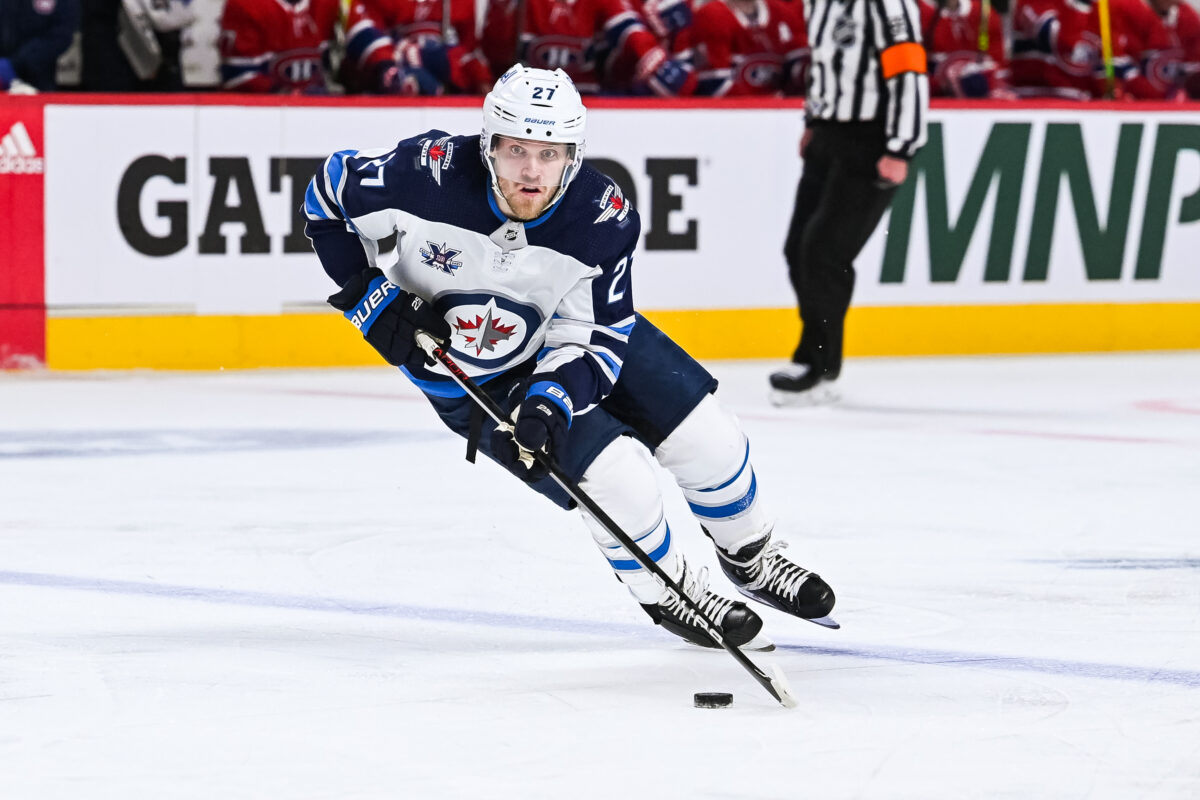Let me open this piece by stating that Samuel Girard is an extremely talented defenseman, uniquely crafted for the modern NHL landscape, and a blueliner that any team should relish having under contract. Unfortunately, the callous reality of the NHL in the salary cap era is that franchises are occasionally forced to make difficult sacrifices in an attempt to allocate their finite financial resources more efficiently. Roster construction is an eternally frustrating juggling act, with team executives constantly surveying for the greatest return on cap investments, and the Colorado Avalanche are no exception. The welcome emergence of prized prospect Bowen Byram coupled with their flailing offensive exploits positions Girard as a prime trade piece to dangle for sorely needed reinforcements.
Girard Represents Great Contract Value
In a rough estimation of Girard’s value relative to the rest of the NHL’s defensemen, it’s useful to stack up his production against his positional peers. As of the 2021-22 season, 54 defensemen hold a cap hit that exceeds Girard’s $5-million, and he compares favorably to most of his contemporaries. Notably, Girard is poised to enter the final season of his contract (2026-27) while still only being 28 years old, promising that the Avalanche, or any teams that trade for him, pay him through what should be the life of his productive peak. Since his NHL debut in 2017-18, the smooth-skating blueliner has accrued 119 points in 281 NHL games, which is accented by an additional 17 points in 37 playoff games. Girard then posted a career-high of 32 points in 48 games in 2020-21, partially buoyed by increased power-play deployment in the wake of Cale Makar’s repeated absences due to injury.

In accordance with his recently elevated importance in the team’s strategy, Girard has scored 0.55 points per game since 2019-20, which ties him for 27th among all defensemen. His clairvoyant playmaking is an obvious talent, feeding off the skill and evasiveness exuded by Colorado’s forwards, as evidenced by his 0.48 assists-per-game (tied for 17th among qualified defenders since 2019). Despite his rapidly expanding offensive capabilities, his place on the Avalanche blue line is threatened by the development of Colorado’s other gifted defensemen.
Byram’s Emergence Makes Girard Expendable
The driving factor in this piece is the welcome – but not unexpected – emergence of Bowen Byram, Colorado’s prized defensive prospect. Byram has admirably stepped into Makar’s shoes, providing a steady outlet of offense at both even-strength and on the power play, while playing the most of any Avalanche defensemen through 10 games. Girard has eclipsed Byram’s power-play usage (19 vs. 18 minutes respectively) but has been much less productive in his allocated minutes, only scoring three points in eight games thus far. It’s early, but the 2019 fourth-overall pick has leapfrogged his elder in the team’s pecking order.
| Byram | Girard | |
|---|---|---|
| G/60 | 0.85 | 0 |
| A/60 | 1.42 | 1.07 |
| A1/60 | 0.57 | 0.36 |
| PTS/60 | 2.28 | 1.07 |
After a turbulent 2020-21 season which saw Byram miss time due to COVID and persistent issues related to concussions, he’s grasped the mantle of Colorado’s number-one defenseman for the time being. The team’s early struggles can hardly be attributed to the 20-year-old, as he’s thoroughly out-chanced, out-shot, and out-scored his opposition at five-on-five. In comparison, Girard has fumbled the opportunity presented by the dual absences of Makar and Devon Toews and is barely treading water possession-wise. It’s only fair to note that with a full lineup, Girard does not bear as much responsibility as he is currently being tasked with, but it’s worrying that a rookie has outpaced him on the depth chart.
| Byram | Girard | |
|---|---|---|
| CF% | 55.2 | 46 |
| xGF% | 56.2 | 47.1 |
| SCF% | 65.1 | 45.3 |
| HDCF% | 57.6 | 50 |
Now, 10 games is a minimal sample, and it’s entirely reasonable that I could be suggesting a trade based on results skewed by a chaotic environment. Still, Girard could easily see himself slide further down the totem pole in short order. Not only has Byram outstripped him in terms of scoring and defensive impact, but Girard’s specialty – zone exits and transition play – is matched by the burgeoning blue line gem. According to Corey Sznajder’s tracking data, Byram completed 59% of his exit attempts with possession last season, compared to Girard’s 47% success rate. Colorado now has a surplus of identical skillsets on its hands, an increasingly tenuous position for Girard as he struggles to claim a spot on a crowded Avalanche back-end.
Avalanche Need to Bolster Forward Group
The Avalanche cruised to capturing the 2020-21 Presidents’ Trophy, powered by an embarrassment of riches among their forward group. Their loaded attacking battalion tallied a league-leading 197 goals, with crucial contributions from depth scorers augmenting the customary production from their superstars. However, cap constraints and the Seattle Kraken’s expansion draft resulted in Colorado’s forward ranks being picked bare. The offseason departures of Pierre-Edouard Bellemare, Joonas Donskoi, and Brandon Saad collectively represented a fifth of Colorado’s goals in 2020-21. Through 10 games, the team is firing at a much less prolific rate (2.9 goals-per-game) than last season’s downright lethal pace of 3.4 per matchup. If they are to approach their previous levels, another top-six forward is needed.
You May Also Like:
- Colorado Avalanche Won’t Be Contenders This Season
- Colorado Avalanche Lineup Projection for 2024-25
- Avalanche Giving Nikolai Kovalenko a Chance to Prove Himself
- 3 Avalanche Players With the Most to Prove in 2024-25
- Peter “Foppa” Forsberg: A Biography
The key to any trade talks is that there are two willing parties with a desire to find a mutually beneficial agreement. Which teams need a facilitating puck-mover on the blue line, can offer a proven scoring forward, and possess the cap space to accommodate Girard’s $5-million in return? It’s a tricky balancing act, and Colorado may be forced to simply flip Girard for picks and the resulting cap space, but to my untrained eye, the Winnipeg Jets could make for an interesting trade partner.
Despite their respectable point totals, Winnipeg’s collection of defensemen (Neal Pionk, Nate Schmidt, and Josh Morrissey) struggle to complete clean zone exits with possession and create scoring chances off of the rush, despite the Jets posting an above-average carry-in rate. It could be a reflection of head coach Paul Maurice’s intentional strategy, but Girard immediately becomes the Jets’ most efficient puck transporter and could help facilitate more dangerous chances for their skilled forwards.

At first glance, Nikolaj Ehlers and Andrew Copp are the most intriguing options, with the pair the Jets’ fifth- and sixth-most utilized forwards. Copp is a more versatile player (leads Winnipeg forwards in average ice-time on the penalty kill), but Ehlers solves Colorado’s scoring (60-point-pace over his career) and transition issues further down in the lineup. Ehlers’ tenure in Winnipeg has occasionally been plagued by trade rumors, but it’s unclear whether the Jets are currently contemplating his exit. In any case, Winnipeg is a division rival and loathe the idea of helping fix a direct competitor. I could be way off base, but the cap hits match up well and address each organization’s on-ice needs. What sort of trade package would you consider to be fair value for Girard?
Is Girard’s Avalanche Future in Jeopardy?
A crucial factor in any potential discussions around Girard’s future within the Avalanche organization is his contract status and any related transactional limitations. The final three seasons of his contract (beginning in 2024-25) carry a modified No-Trade Clause (NTC), limiting Colorado’s flexibility in seeking the best possible return. Nathan MacKinnon’s future contract extension looms over the Avalanche roster, and being able to replace Girard’s output with a cheaper replacement suggests that his days on Colorado’s books are numbered. Barring an unforeseen jump in the salary cap, 2021-22 could regrettably be Girard’s final season in Denver, a truly tragic consequence of the cap era.
Data courtesy of Corey Sznajder, Hockey Reference, and Natural Stat Trick.
